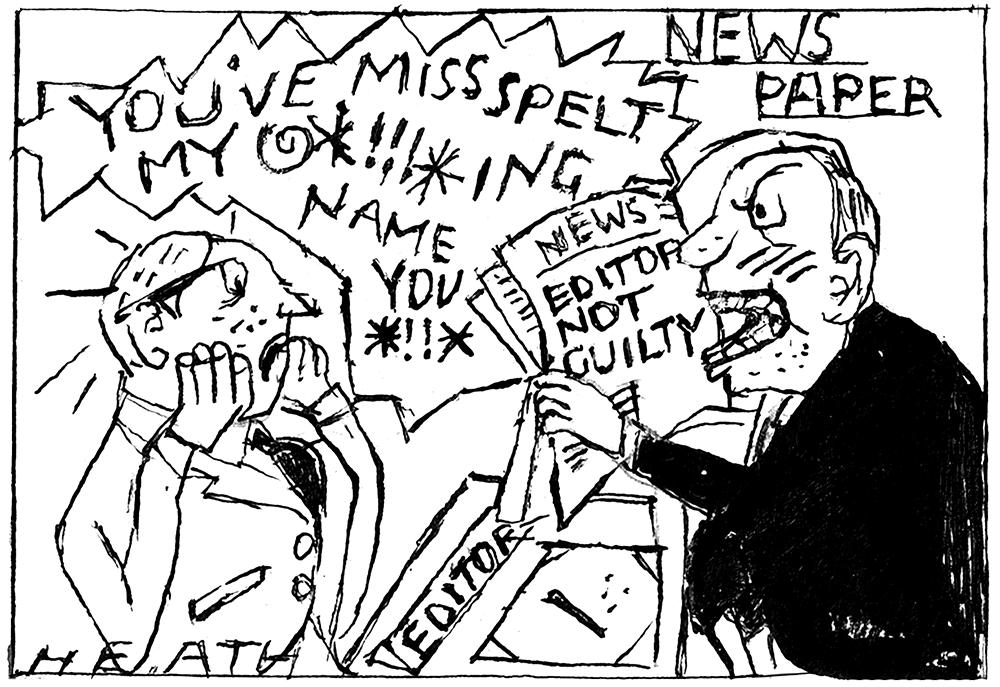
Christopher Howse has narrated this article for you to listen to.
Afriend of mine was once delighted to get a job at the Radio Times, where he ‘corrected’ a golfing picture caption to ‘Steve Ballesteros’. Typos, literals or misprints are often committed in an effort to expunge them.
Pity the poor subeditor who blanked out the wrong half of the word that is conventionally printed as mother*****r. The harder you try to whack the moles, the faster they come. The other rule is: the bigger, the easier to miss. In 96pt type the front-page headline in the Guardian on 5 November 1980 was: ‘Landside makes it President Reagan.’
That is what optimistic journalists call a ‘self-correcting literal’ – one that readers miss. But there’s the danger. I remember 40 years ago a small ad for a personal assistant appearing in The Spectator from a grand Scottish landowner stipulating that the applicant ‘must be interested in conversation’. In reality the laird was not lonely but keen on conservation.
Before digitisation, there used to be a thing called Palmer’s Index to the Times, which gave an impression of utility that it often failed to live up to. Who would guess the nature of this index entry for 23 January 1882, under ‘Harcourt, Sir W’ (the home secretary): ‘Gross Line Interpolated Maliciously in a Few Copies only’?
The ‘Gross Line’, in the report of a speech at Burton-on-Trent, was the misprint: ‘The speaker then said he felt inclined for a bit of fucking.’ It was probably ill-judged to wait four days and then publish an apology on the leader page that didn’t quite say what the ‘outrage’ was. The edition became a collector’s item.
Does that interpolation, attributed to a disgruntled compositor, count as a typo? More expensive to Robert Barker, the King’s Printer who had brought out the Authorised Version of the Bible in 1611, was to omit the word ‘not’ in one of the Ten Commandments in an edition of 1631, making it read: ‘Thou shalt commit adultery.’ He was brought before the Star Chamber, fined and died in a debtor’s prison. Some horrors are own-goals. The High Victorian poet A.H. Clough (whose best known couplet, from his satirical ‘The Latest Decalogue’, is ‘Thou shalt not kill; but need’st not strive/ Officiously to keep alive’) seems to have been the victim of a practical joke by a Gaelic speaker when he chose the title ‘The Bothie of Toper-na-fuosich’ (1848) for a poem about an Oxford undergraduate who fell in love with a crofter’s daughter. (The Spectator reviewed it in a ‘contemptuous’ piece, Clough complained.) After publication Clough was embarrassed to be told that the phrase in the title was a bawdy Highland toast to part of the female anatomy. For a new edition he substituted ‘Tober-na-Vuolich’, a safely meaningless invention.
New technology means new typos: autocorrection and weird subtitles on the television. Innovatively in a speech last year Sir Keir Starmer, the Prime Minister, introduced an oral error that was based on no typo in his text, when he demanded the ‘return of the sausages’. It is strange that W.C. Sellar and R.J. Yeatman should have included ‘For sausage read hostage’ in their jocular errata to 1066 and All That 96 years before the mistake was made.







Comments